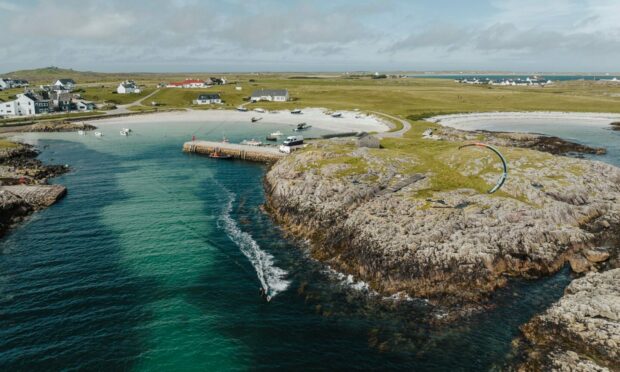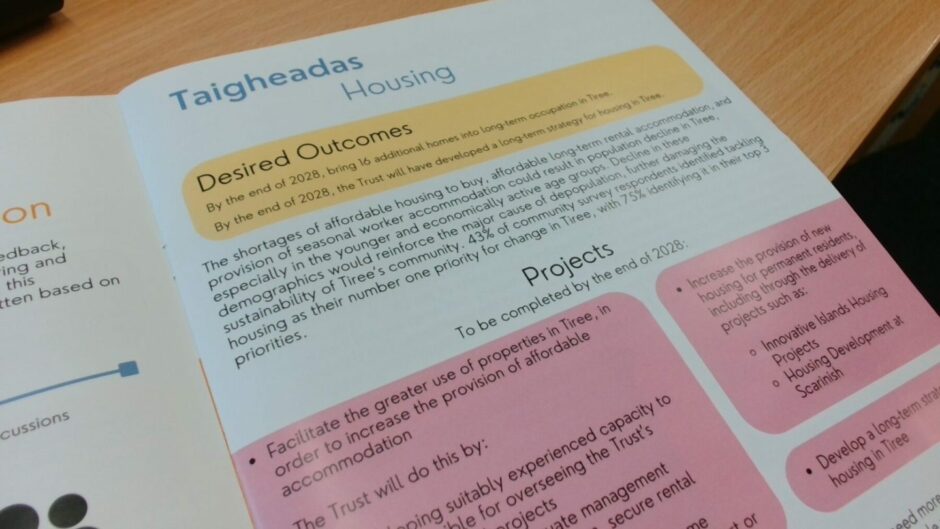New statistics show that there are dozens of people ready to settle in Tiree’s community – but almost half of its houses are taken up by non-permanent residents.
The community-led Tiree Trust has published new figures showing the extent of the island’s housing crisis.
According to a poll carried out by the Communities Housing Trust, 43 people are currently searching for full-time homes in Tiree.
21% of them already have a job offer.
The research also identified that people already living in Tiree who are looking for their own housing could make up 21 new households.
But that housing simply isn’t available.
46% of Tiree houses not for permanent residents
Tiree Trust’s Phyl Meyer says that the biggest problem is that housing that could be permanent is being used as short-term lets and second homes.
The Communities Housing Trust’s research found that 46% of Tiree’s housing is a second home, a short-term let, or unoccupied.
“Almost half of the housing stock is essentially locked out,” Mr Meyer says.
The demand for short-term lets is also driving up house prices.
“The average price of a house on sale in Tiree last year was £352,000,” Mr Meyer says. “Not many people can afford to buy that, especially as their first home.”
For Tiree’s young people, finding a home of their own on their island is “really, really tough”.
‘Encourage people to offer long-term lets’
The Tiree Trust is to tackle the housing crisis in two ways: by creating more housing and helping to free up space in existing properties.
They are trying to “facilitate and encourage people to consider offering long-term lets on property that they have”.
For holiday home owners, long-term lets “might not make quite as much money, but it’s a lot less hassle,” says Mr Meyer.
The trust is working to “signpost them to some information to make it a bit easier for them to make the switch”.
“Even two or three houses going to long-term let would be a win for us.”
The Tiree Trust also hopes more housing is on the way.
‘Take forward a different approach’
“We’re going to be taking forward a conventional housing development of probably 12 to 14 units,” Mr Meyer says.
“We will be applying very soon to the Scottish Government Rural Housing Fund for that.”
At the same time as their more ambitious plans, the Trust is “hoping to take forward a different approach at the same time, which is more focused on one-off builds on individual small sites”.
“In some cases we have people who live here who have access to a croft site where their house could be,” says Mr Meyer. “But the financing and the logistics of actually building that house are beyond them.”
Supporting crofters looking to build a home
The Trust hopes to have government support to be able to take on the planning and building of homes themselves, which can then be sold to the original landowners for an affordable price.
That way, Mr Meyer says, local people can “apply for a standard mortgage rather than having to get a self-build mortgage”.
They would also be able to put a system in place to stop the houses from being used as short-term lets in the future.
“[We] would make it a condition of the deed, that it must be the primary residence of someone who lives in Tiree,” he says. “And if it’s going to be sold, we get to buy it back at market value so it can be put to the same use again.”
But while there could be more homes on the horizon, Mr Meyer stresses that the challenge of housing in Tiree isn’t just about finding a place to live.
78% living in fuel poverty
Sky-rocketing fuel costs mean that, even if they have a home, residents are struggling.
The Communities Housing Trust poll also asked “a wide range of questions about energy efficiency”.
“Of the people in Tiree who responded, 78% are classed as being in fuel poverty,” says Mr Meyer. “Which is three times the UK average.”
“Heating your home can be very expensive here,” he adds, with much of the existing older housing being “difficult to insulate”.
The trust is working with individuals in the community to support them to improve their resilience against fuel poverty.
Short-term financial funding is important, Mr Meyer says, but so is long-term support.
“We’re trying to look at how can we help people to make the changes that will mean that they’re not going to be as vulnerable to poverty in the future.”
More local reporting from the Hebrides:

